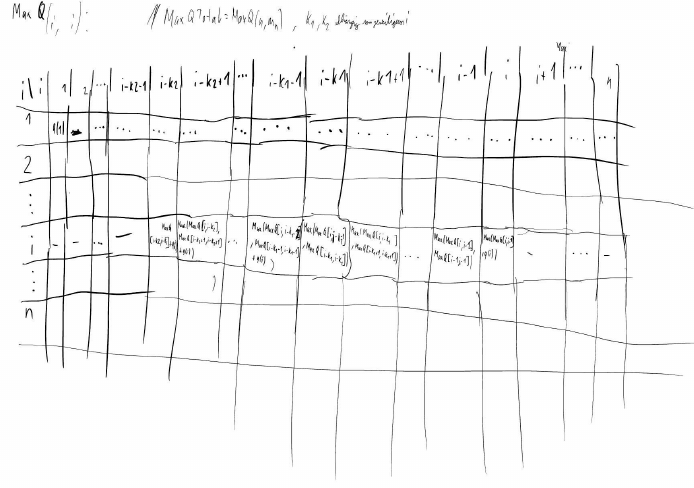My experience as a Teaching Assistant at ETH
17. December 2021 • 5 min readThis semester I’ve been teaching the course “Algorithms & Datastructures” at ETH for the first time as a Teaching Assistant. That means that every week, I’d lead an exercise session with about 25 people where I would explain the exercises, recap some theory and highlight common pitfalls. In addition, I would correct and grade bonus exercises. Here’s what I learnt, how I liked it, and what I’d do differently if I did it again (which I might, who knows!).
Classroom teaching
Teaching is fun! I already thought beforehand that standing in front of a group of students and trying to get my point across would be something I like; especially given that I’ve been playing with the thought of becoming a part-time teacher at high school level after ETH for a while. And now, after a semester of actually teaching, I can conclude that I indeed do enjoy giving lessons, and that the “aha”-moments of my students had made the challenges of explaining well worth it.
I also have seen how it’s critical to strike the balance between preparing every detail of your lesson and improvising everything. Sometimes it’s possible to walk into the room having barely looked at the exercises and hold a good, (hopefully) helpful two hour lesson nearly without any preparation. But then again that can easily come back and bite you; I distinctly remember a moment where a student was asking me to explain a more challenging exercise, I said “Yeah, sure”, started doing it and got lost halfway through. No one paid attention anymore, and I had to regretfully end the lesson not having explained the exercise.
At the same time, the semester confirmed what I had already thought to be true earlier on: to be a good Teaching Assistant, it’s not necessary to know everything. It’s fine to not have an answer immediately, and it’s also fine to be wrong (at least occasionally).
Correcting exercises
Ugh. I don’t like correcting stuff. Of course I know that it’s required, and that a good correction can be very helpful. But the hours I spent every week on wading through proofs that ranged from basically perfect to me barely understanding the idea after multiple perusals weren’t exactly enjoyable.

Ah yes. My students were the best, absolutely, but sometimes a slightly cleaner solution wouldn’t have hurt.
A note on Kahoots
In 2021, seemingly no lecture or exercise session can avoid using the omnipresent quiz platform Kahoot. Now see, I get it. It’s fun to compete and win, and it’s great to activate all students instead of only hearing from the select few that are brave enough to raise their hand. But honestly, I really don’t like Kahoot. First, they aggressively try to upsell you on a hundred different subscriptions, and they at one point just forbid me to host a quiz for more than 10 players, requiring me to pretend to be a K-12 teacher. (Oh, and don’t get me started on them recommending wonderful “Elsa in Frozen 2” quizzes to me.) But more importantly, I think that Kahoots are not a good didactic tool.
The simple reason for that is the fact that the best way to win a quiz is not by thinking thoroughly about your answer but to click as fast as possible once you have a decent guess. That’s neither how the exams nor real life works. As such, you can easily win a Kahoot even if others have more correct answers in total, and that makes Kahoots unrepresentative of actual student performance, which is exactly what you as a teacher want to know.
Anyways. Rant over.
Organizational matters
Eh, fine. I would have appreciated knowing which exercises will come next in advance, so that I could tell students what I want see in their approach. Oh, and it turns out that an actual grading scheme that includes how one should grade common errors would be very helpful. But I get that this requires a lot of work, so I don’t think it’s unreasonable not to do that.
Ah, and I always got paid on time (in contrast to other subjects where this can take multiple months… Parallel Programming, I’m looking at you).
What I would change
I’m not certain it’s sensible to always discuss all bonus exercises. We were explicitly told by the Head TA to do so and to also discuss most non-bonus exercises, but due to the large gap of skill (some people solved the exercises without any problems and are bored when explaining, whereas others didn’t even try and thus don’t benefit either) I think it might make more sense to focus more on theory recaps.
I’d like to have some sort of more direct channel of communication with my students. It’d be great to have students tell me in advance what they haven’t understood yet, because then I can actually prepare these topics.
Finally, I believe there are still a lot of potential synergies among us TAs that we could use to lower our work load and improve our lessons - sharing notes, additional resources, explanations on solutions, etc. (Ah, you can find some of my stuff on xyquadrat.ch/eth/and, by the way.)
Closing thoughts
Teaching, even if in a small setting like in my case, is very fulfilling. It’s great to see students understand something because you were able to get your point across. A great TA can make a course easy, whilst a bad one can rob you of all your motivation to study. Whilst I might not have been the best or even a great TA, given that I still had about as many people in my session at the end of the semester as in the beginning, I think I’m also not that bad. And that’s pretty cool, honestly.